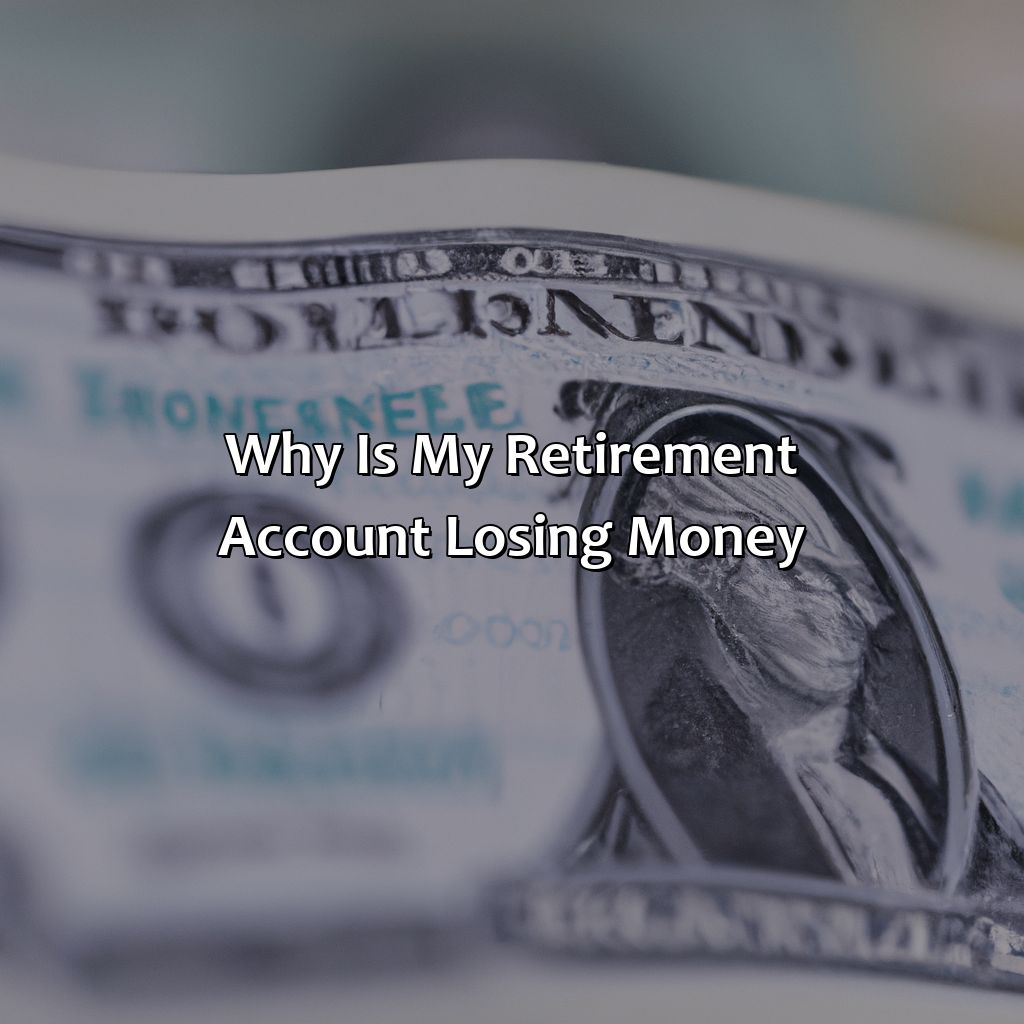Why Is My Retirement Account Losing Money?
Key Takeaway:
- There are various reasons why retirement accounts may lose money, such as inflation, high fees, poor investment decisions, and economic factors.
- Economic factors can affect retirement accounts through changes in interest rates and market conditions, which can impact the performance of investments and the overall value of the account.
- Investment decisions also play a significant role in retirement account losses, including the level of risk taken and the portfolio’s diversification, both of which can impact an account’s long-term performance.
- In addition, fees and expenses imposed on retirement accounts can eat away at the account’s value over time, making it essential to carefully consider costs when choosing a retirement account provider or investment strategy.
- To minimize losses in retirement accounts, it is crucial to develop a sound investment strategy, including diversification, risk management, and regular monitoring of account performance. Consulting with a financial advisor can also be beneficial in creating a personalized plan for retirement investing.
Do you worry about the security of your retirement fund? Recent market fluctuations have left many investors anxious. Understand why your retirement account may be losing money and what you can do to protect it.
Reasons why retirement accounts lose money
Retirement accounts are often a reliable source of financial security during post-career life. However, when they start losing money, it can be a cause of concern for many individuals. Here are some reasons why retirement accounts may lose money:
- Market Volatility: Fluctuations in the market can cause fluctuations in the value of investments, which can lead to losses in retirement accounts.
- High Fees: Retirement accounts often charge fees for maintenance, investment management, and transactions, which can eat into the returns.
- Unwise Investment Choices: Investing in high-risk, low-return assets can cause retirement accounts to lose money over time.
- Inflation: The purchasing power of retirement account investments can be eroded by inflation, reducing the overall value of the account.
Despite the above factors, it’s always advisable to plan for your retirement as early as possible and to do so with a level head, keeping in mind your risk tolerance along with your needs and objectives for post-retirement life. A retirement planner can help with that.
Pro Tip: Consult with a financial advisor to better understand the risks and rewards of your investment strategy.
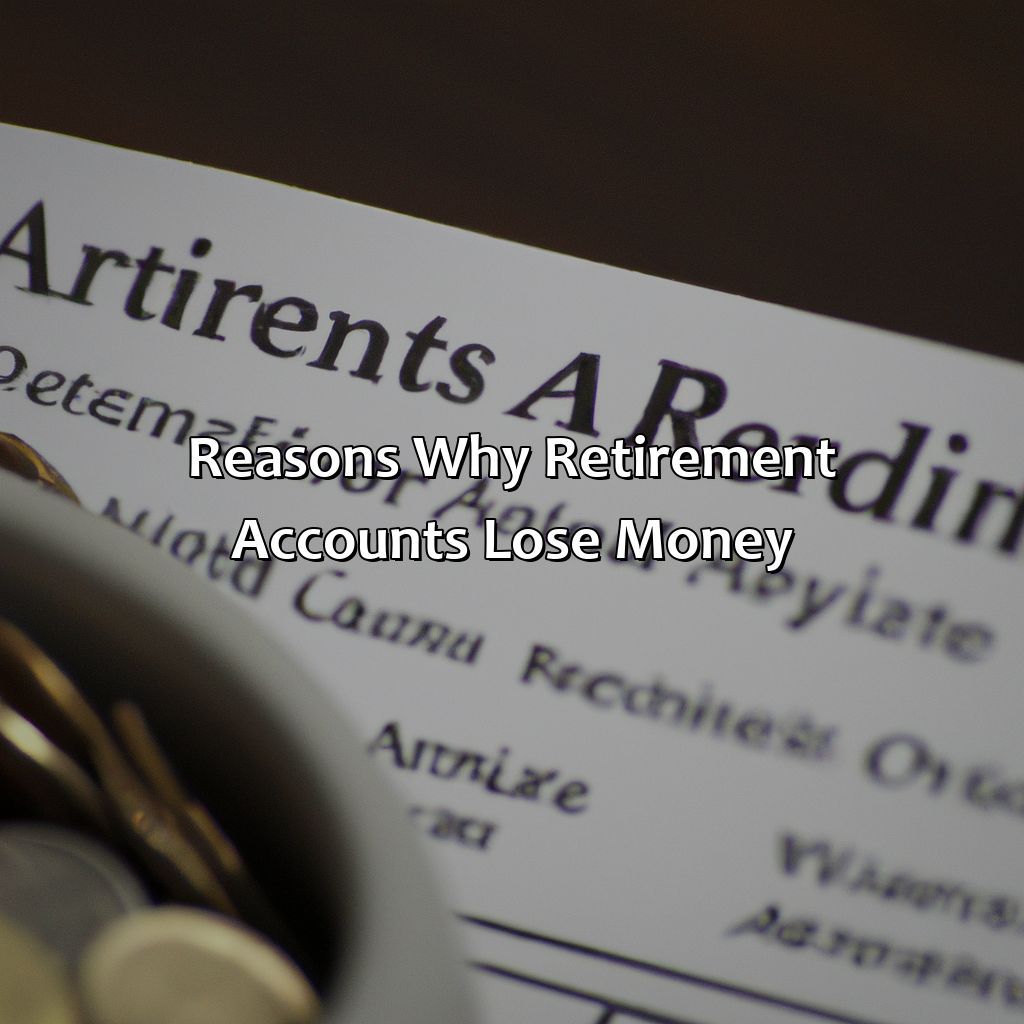
Image credits: retiregenz.com by Yuval Arnold
Economic factors affecting retirement accounts
Wanna understand why your retirement account could be taking losses? Check out the economic factors. Interest rates and market conditions are two big pieces of the puzzle. We’ll check out how these can lead to losses in your retirement account. So let’s explore how they have an effect!
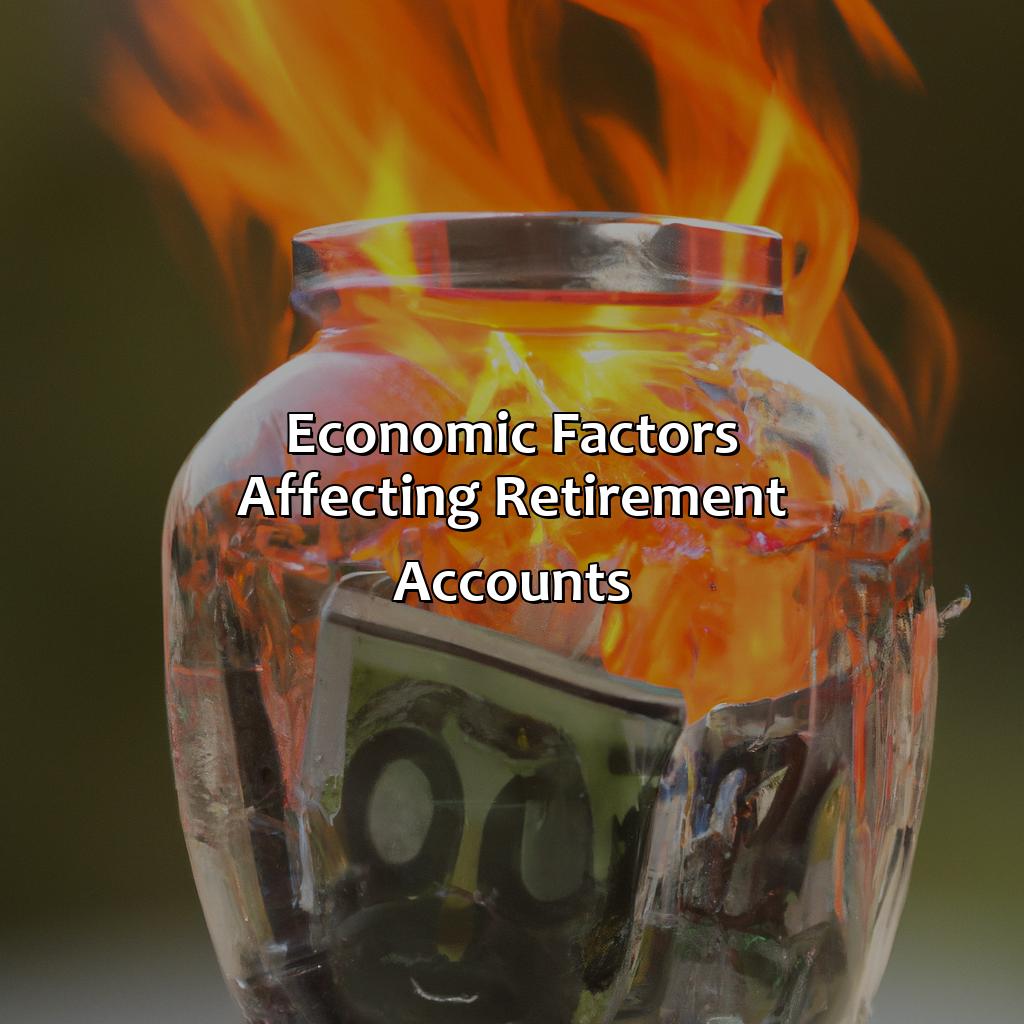
Image credits: retiregenz.com by Harry Woodhock
Interest rates
The Impact of Fluctuating Interest Rates on Retirement Savings
Fluctuating interest rates can have a significant impact on retirement savings. Changes in interest rates can influence the value of bonds and other fixed-income investments that many retirees depend on for income. When interest rates rise, bond prices typically fall, leading to paper losses for investors who hold those bonds. Conversely, when interest rates decline, bond prices usually rise, providing a boost to the value of fixed-income portfolios.
The effect of interest rate fluctuations is particularly important for retirees who rely heavily on fixed-income investments to generate income during their post-employment years. Since retirement accounts are designed to provide long-term savings, it’s essential to consider factors like interest rate trends and their potential effects when making investment decisions.
In today’s economic climate, low-interest rates have become the norm in many parts of the world, leading some experts to suggest that retirees may need to rethink traditional strategies for generating income from their retirement savings. For example, some financial advisors are recommending alternative investment approaches such as dividend-paying stocks or real estate investment trusts (REITs) that may offer potentially higher yields than bonds or other fixed-income securities.
Consider the story of Mr. Smith: A retiree with substantial savings invested primarily in bonds. As interest rates began to rise in 2016, Mr. Smith saw the value of his bond portfolio decrease significantly. Concerned about losing further money, he shifted his allocation towards cash and equities, but this approach also carried risks and reduced his overall portfolio returns over time. Mr. Smith learned firsthand the importance of understanding how economic factors like fluctuating interest rates can impact retirement accounts and the significance of creating a balanced and well-diversified portfolio to minimize risk while optimizing returns over time.
I guess the only thing that’s certain in the stock market is uncertainty, and maybe the fact that I’ll never fully understand it.
Market conditions
The state of the economy greatly impacts retirement accounts. Economic fluctuations, such as sudden market dips, can have a negative impact on investments. Retirement accounts invested in stocks and mutual funds can suffer greatly during a bearish market, causing losses. The performance of the economy is not the only factor affecting retirement accounts as inflation and changes in interest rates can also have an impact.
Investors should consider their investment portfolios and ensure they are diversified to spread out risks. Diversification across various classes can help mitigate any significant losses that may result from an economic downturn. Additionally, one should consider rebalancing their portfolio frequently to maintain the proper asset allocation.
Stock markets have seen significant dips throughout history due to unexpected circumstances like wars, natural disasters or pandemics; these events affect global economies and lead into economic recessions. These downtrends cause retirees to question whether it’s time for them to cash-in their savings or wait out until better times come around; this uncertainty causes fear among people who’ve worked hard their whole life for retirement security.
Remember, the only thing riskier than making bad investment decisions for your retirement account is letting your in-laws make them for you.
Investment decisions affecting retirement accounts
Secure your retirement account! Ensure you make wise investment decisions. Focus on risk and diversification of your portfolio. You must understand the basics of investing and how diversification affects your retirement account. Doing so will guarantee stability.

Image credits: retiregenz.com by James Arnold
Level of risk
Investment Risk in Retirement Accounts: Understanding the Factors Influencing Loss
The level of investment risk is a significant factor that affects retirement accounts, contributing to both gains and losses. Risk exposure varies on account of several variables, such as market fluctuations, economic conditions, and account diversification strategies.
Retirement investors must understand how various assets fit into their portfolio and assess each’s risk before committing funds. Experts recommend not being too conservative or too aggressive when choosing investments; instead, they suggest diversifying into different areas to lessen the impact of recessions.
Furthermore, careful monitoring of financial markets can be helpful, along with regular rebalancing efforts to maintain a consistent risk posture. By taking these steps proactively and staying informed about the latest developments in the investment universe can help minimize risks associated with retirement accounts.
For example, a retiree invested heavily in tech stocks was hit hard by the 2008 market crash. After speaking with an advisor about diversification tactics and keeping a long-term mindset regarding investing strategy, this person was able to regain much of what they lost years later through targeted asset allocation.
A well-diversified portfolio is like a good party platter – don’t put all your chips in one dip.
Diversification of portfolio
A well-diversified portfolio is crucial for managing risks and maximizing returns. By investing in a range of asset classes, such as stocks, bonds, and real estate, investors can offset losses in one area with gains in another. An optimal mix will depend on factors such as age, risk tolerance and investment goals.
Moreover, diversification helps to spread the risk across different strategies within each asset class. For example, when it comes to stocks, diversification reduces exposure to any single company or industry by investing in multiple sectors. Similarly, within bonds allocation should be spread among various credit ratings and maturities.
In addition to mitigating risk, diversification is also essential for capitalizing on opportunities and achieving better long-term returns. A variety of assets ensures that investors gain exposure to different market conditions and economic cycles.
One investor’s experience highlights the importance of diversification. In 2008, he had a short-term bond fund which was not well diversified. Due to its narrow focus on a specific debt instrument related to subprime mortgages the fund suffered significant losses amidst the financial crisis. The investor learnt his lesson the hard way – that diversity is key to prevent sizable losses that can wreak havoc on one’s retirement funds.
Retirement accounts aren’t losing money, they’re just paying for a luxurious retirement for the guy managing the fees and expenses.
Fees and expenses imposed on retirement accounts
Retirement Account Costs: Uncovering the Expenses Incurred
Retirement accounts come with costs, ranging from administrative and management fees to transaction and account maintenance fees. These expenses may eat into your retirement savings, leading to a reduction in investment returns.
Column 1: Retirement Account Costs
Column 2: Charges Incurred
Column 3: Impact on Investment Returns
Management Fees: Up to 1% of assets managed
Transaction Fees: Per Transaction cost- $50
Account Maintenance Fees: Yearly cost- $100
The expenses incurred by retirement accounts can have a significant impact on one’s overall investment returns. Management fees can amount to as much as 1% of assets managed, transaction fees can cost upwards of $50 per transaction, and yearly account maintenance fees can add up to $100 per year.
Retirement Account Expenses – Digging Deeper
Fees and expenses are not uniform or standard with all retirement accounts. Some accounts may have lower fees, while others with additional features and benefits may have higher expenses. It’s important to evaluate related expenses when selecting a retirement account.
True Story
A couple was shocked to learn they were paying multiple fees in their retirement account. After analyzing their managed portfolio, they found that the fees charged were excessively high and that they could have saved a substantial amount of money had they selected an account with lower expenses.
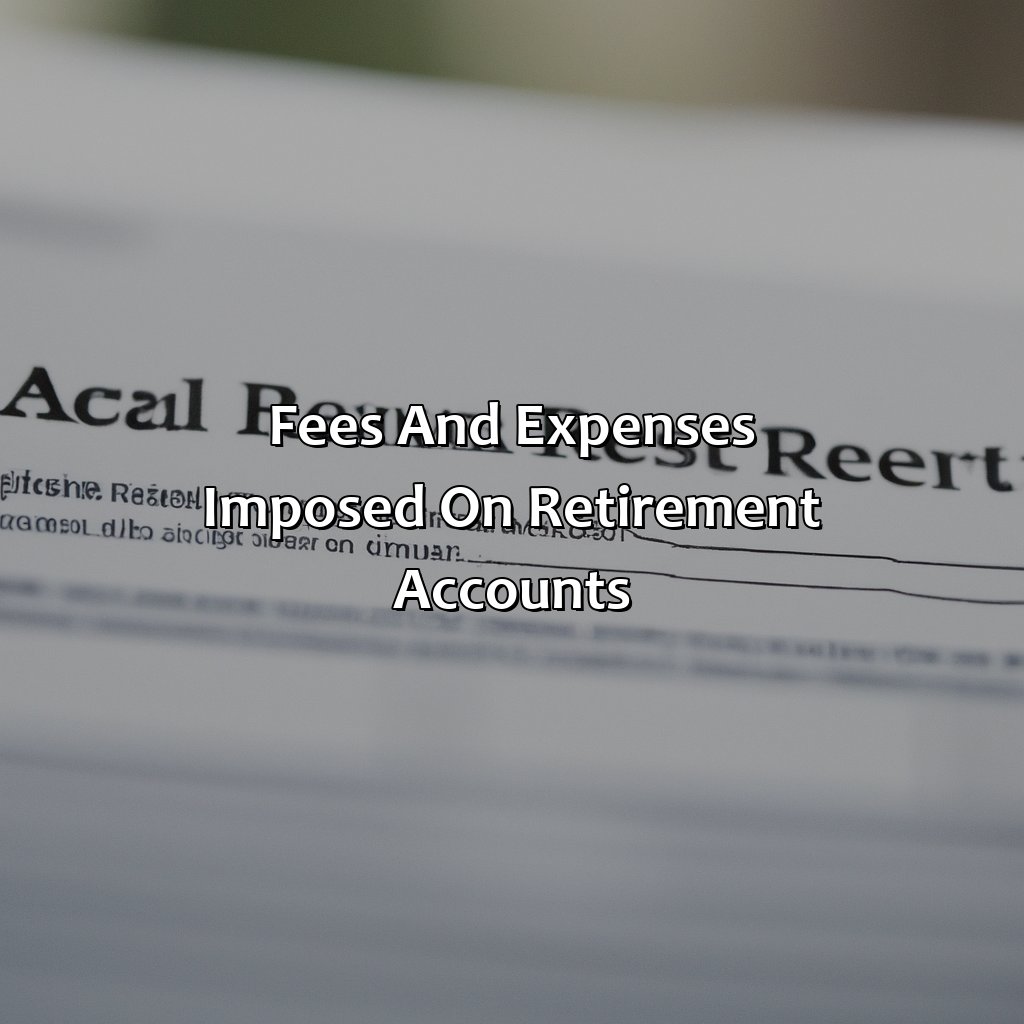
Image credits: retiregenz.com by Joel Woodhock
Strategies to minimize losses in retirement accounts
In retirement accounts, minimizing losses is essential for long-term financial stability. Here are some effective strategies:
- Diversify your investments across various asset classes.
- Continuously monitor and adjust your portfolio based on market changes.
- Invest in low-cost index funds or exchange-traded funds (ETFs).
- Avoid emotional decisions and stick to a long-term investment plan.
- Consider professional financial advice.
- Maximize tax-efficient savings, such as through a Roth IRA.
Notably, retirees should keep in mind that focusing solely on minimizing losses can prevent optimal investment growth.
According to a recent survey by Fidelity Investments, the average 401(k) balance for people who consistently contributed for 10 years straight rose to $305,900 in the second quarter of 2021.
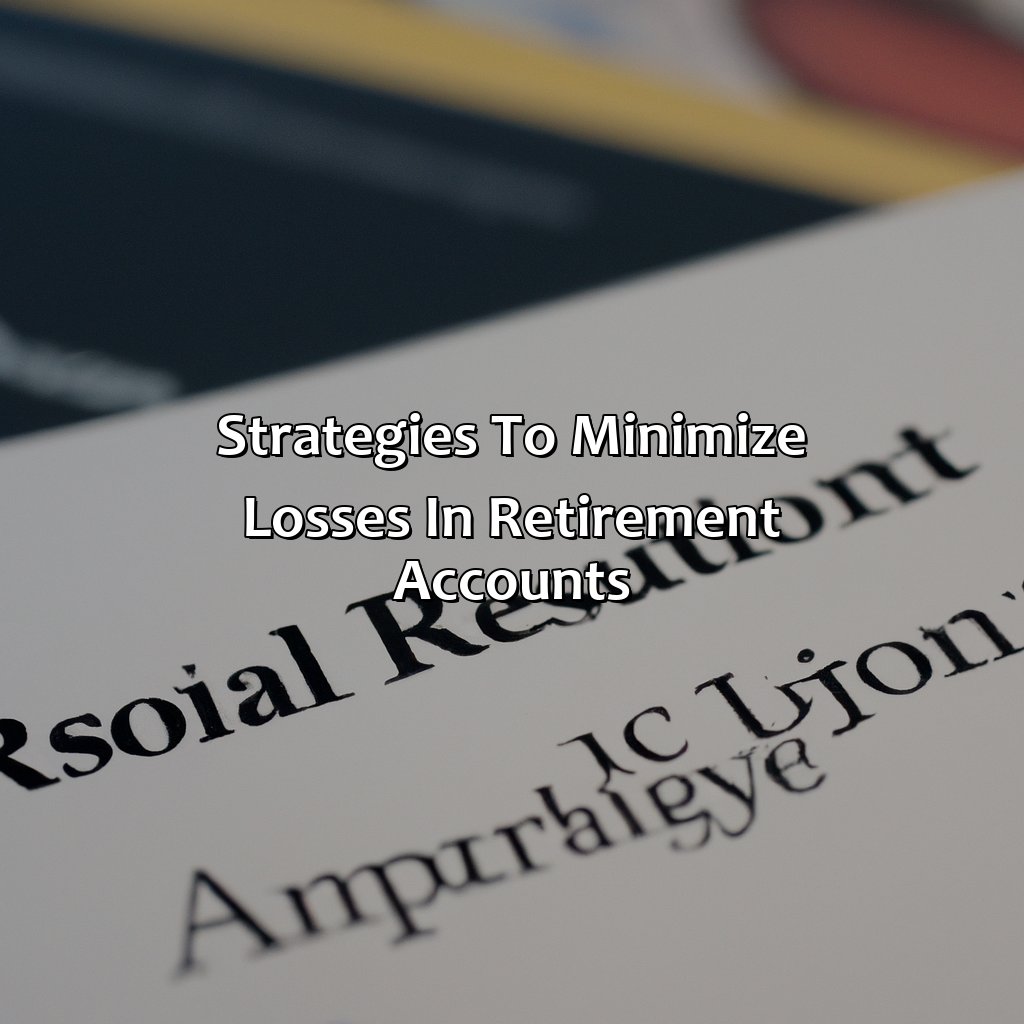
Image credits: retiregenz.com by James Washington
Five Facts About Why Is My Retirement Account Losing Money:
- ✅ One of the most common reasons for losing money in a retirement account is market volatility. (Source: Forbes)
- ✅ Poor investment choices or mismanagement by the fund manager can also lead to losses in retirement accounts. (Source: Investopedia)
- ✅ Increased fees and expenses charged by the retirement fund can eat into the returns and lead to losses. (Source: The Balance)
- ✅ Taking early withdrawals from retirement accounts before reaching the retirement age can trigger penalties and reduce the overall returns. (Source: CNBC)
- ✅ Failing to diversify the investment portfolio and relying on a single asset class can increase the risk of losses in a retirement account. (Source: CNN Business)
FAQs about Why Is My Retirement Account Losing Money?
Why is my retirement account losing money?
There could be various reasons why your retirement account is losing money. Some of the common reasons include market volatility, economic downturn, poor investment choices, and high fees charged by your financial advisor or brokerage firm.
Can market volatility impact my retirement account?
Yes, market volatility can have a significant impact on your retirement account as the value of your investments may go down due to factors beyond your control, such as economic conditions, geopolitical events, and company-specific news. It is important to have a diversified portfolio to mitigate the impact of market volatility.
What are poor investment choices that can hurt my retirement account?
Investing in highly speculative stocks, placing all your money in a single company or asset class, or not investing in a balanced and diversified portfolio can be poor investment choices that can hurt your retirement account. It is important to consult a financial advisor or do your own research before making investment decisions.
Can high fees charged by my financial advisor or brokerage firm hurt my retirement account?
Yes, high fees can eat into your investment returns and hurt the growth of your retirement account over the long term. It is important to review the fees charged by your financial advisor or brokerage firm and compare them with other providers to ensure you are not paying more than you should.
Should I panic if my retirement account is losing money?
Panic is not a helpful emotion when it comes to investing. It is important to remember that the market goes through ups and downs, and short-term losses are a normal part of the investment cycle. It is important to stay disciplined, stick to your long-term investment plan, and seek professional advice if necessary.
What can I do to prevent my retirement account from losing money?
While it is impossible to completely prevent your retirement account from losing money, there are steps you can take to mitigate the impact of market volatility and poor investment choices. These include diversifying your portfolio, reviewing your investment strategy with a financial advisor, investing in low-fee index funds, and staying disciplined and patient during market ups and downs.
